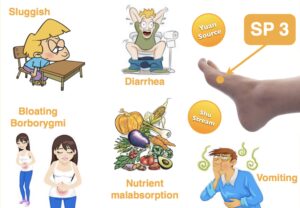Traditional Chinese Medicine (TCM) approaches high blood pressure as an imbalance in the body, and it identifies several differentiations or patterns that may contribute to high blood pressure. In TCM, “high blood pressure” is considered one SYMPTOM of an accurate root cause diagnosis – NOT the END of the CONVERSATION!

High BP
TCM Liver Yang Rising causing High Blood Pressure:

Liver Yang Rising: This differentiation is associated with hypertension due to emotional stress, anger, or frustration. In this pattern, the liver energy becomes excessive and overactive, leading to an increase in blood pressure. Similarly, symptoms are one or more of the following: feeling hot, angry or frustrated – including at yourself, constipated, headache, and ringing ears.
Foods that help: Lemon, lime, asparagus, mung bean, celery, seaweed
What to avoid: Hot spicy foods, alcohol
Liver Yang Rising can cause Migraines. Click here for more info on how TCM can treat migraines: https://longevitywellnessclinic.com/services/migraines/
TCM Kidney Yin Deficiency causing High Blood Pressure:

Kidney Yin KD 6
Kidney Yin Deficiency: Kidney Yin represents the cooling, nourishing, and calming aspect of the body, which helps to balance the Yang or the warming and active aspect of the body. When the Yin energy of the kidney is deficient, the Yang energy can become excessive, leading to hypertension.
Foods that help: Millet, black and kidney beans, blueberries, spirulina, seaweed, black sesame seed
What to avoid: Anger, stress, alcohol, coffee, spicy foods
Kidney Yin Deficiency can cause Brain Fog. Click here for more info on how TCM can treat Brain Fog. https://longevitywellnessclinic.com/services/brain-fog/https://longevitywellnessclinic.com/services/brain-fog/
TCM Spleen Qi Deficiency causing high blood pressure

Tonify Qi with SP 3
The spleen is considered an important organ that is responsible for the transformation and transportation of food and fluids, as well as the production of qi (vital energy) and blood. Spleen qi deficiency is a TCM diagnosis that indicates the spleen is not functioning properly and may lead to a range of symptoms.
Some of the common symptoms of spleen qi deficiency include:
- Fatigue or low energy
- Digestive issues, such as bloating, gas, and loose stools
- Poor appetite or craving for sweets
- Weight gain
- Weakness in the limbs or muscles
- A tendency to worry or overthink
- Pale complexion
Foods that help: Carrots, turnips, sweet potato, yam, pumpkin
What to avoid: Cold foods and raw foods
Traditional Chinese Medicine approaches the root cause of high blood pressure, and has been used for thousands of years to help balance internal blood pressure systems.
Spleen Qi Deficiency can also cause digestive disorders.
References:



